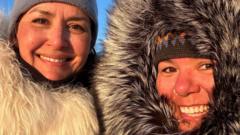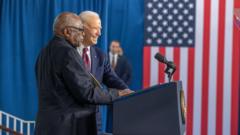In the heart of Canada's Arctic territory, elections face unique challenges that reflect the vast landscape and its people.
The Unique Terrain of Nunavut Elections: A Challenge Like No Other

The Unique Terrain of Nunavut Elections: A Challenge Like No Other
Exploring the complexities of campaigning in Canada's largest and coldest federal district.
Nunavut, encompassing 1.8 million square kilometers and home to 40,000 residents, is Canada's most expansive federal district, representing a unique case in national elections. Kathy Kettler, campaign manager for Liberal candidate Kilikvak Kabloona, highlighted the magnitude of this territory, emphasizing that if Nunavut were a country, it would rank the 13th largest globally, behind only Greenland. The capital, Iqaluit, experiences below-freezing temperatures for eight months a year, and air travel is essential for moving between its 25 communities.
Daily campaigns often entail long flights; Kettler reported traveling 1,700 km in a single day to connect with constituents in multiple communities. She noted that few understand the local dynamics compared to southern Canada. Personal interactions in Nunavut also reflect a distinct cultural norm — knocking on doors is viewed as intrusive, with warmer relationships allowing visitors to enter homes unannounced. As an Inuk from northern Quebec, she described grappling with this cultural difference while canvassing in frigid conditions.
Language is another barrier; many residents are Inuit and speak Inuktitut, leading to increased costs for translating campaign materials and hiring interpreters. Addressing unique local issues is also paramount during elections. While national campaigns often center on Arctic security and sovereignty, the primary concerns for Nunavut residents center around food security and basic survival. Kettler shared that access to affordable food and clean water remains a staggering challenge, often compelling families to prioritize basic necessities over phone plans.
Currently, the NDP holds the seat, with incumbent Lori Idlout vying for re-election against Conservative James Arreak. However, the logistical hurdles of conducting elections in such remote areas remain significant. Jean-Claude Nguyen, the region's returning officer, explained the difficulty in ensuring that ballots reach every community, including remote gold mines. Past elections have highlighted the unpredictable challenges of the North, including a humorous incident where a raven damaged a ballot box.
Ultimately, despite the trials faced, Kathy Kettler finds fulfillment in the bonds formed with local residents. "The generosity, love, and care that people have for each other in every community shines through," she observed, underscoring the meaningful connections that make campaigning in Nunavut deeply impactful. As this unique district navigates the complexities of its electoral process, the spirit of its people remains a guiding light.
Daily campaigns often entail long flights; Kettler reported traveling 1,700 km in a single day to connect with constituents in multiple communities. She noted that few understand the local dynamics compared to southern Canada. Personal interactions in Nunavut also reflect a distinct cultural norm — knocking on doors is viewed as intrusive, with warmer relationships allowing visitors to enter homes unannounced. As an Inuk from northern Quebec, she described grappling with this cultural difference while canvassing in frigid conditions.
Language is another barrier; many residents are Inuit and speak Inuktitut, leading to increased costs for translating campaign materials and hiring interpreters. Addressing unique local issues is also paramount during elections. While national campaigns often center on Arctic security and sovereignty, the primary concerns for Nunavut residents center around food security and basic survival. Kettler shared that access to affordable food and clean water remains a staggering challenge, often compelling families to prioritize basic necessities over phone plans.
Currently, the NDP holds the seat, with incumbent Lori Idlout vying for re-election against Conservative James Arreak. However, the logistical hurdles of conducting elections in such remote areas remain significant. Jean-Claude Nguyen, the region's returning officer, explained the difficulty in ensuring that ballots reach every community, including remote gold mines. Past elections have highlighted the unpredictable challenges of the North, including a humorous incident where a raven damaged a ballot box.
Ultimately, despite the trials faced, Kathy Kettler finds fulfillment in the bonds formed with local residents. "The generosity, love, and care that people have for each other in every community shines through," she observed, underscoring the meaningful connections that make campaigning in Nunavut deeply impactful. As this unique district navigates the complexities of its electoral process, the spirit of its people remains a guiding light.






















